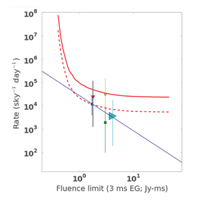Fast Radio Bursts
 FRBs are millisecond radio bursts identified in single dish observations, but as yet not localized on the sky to any accuracy, nor associated with any astrophysical object. These sources could originate at cosmological distances, possibly signifying the death of binary neutron stars, and hence present critical cosmological probes. However, localization is crucial. Law et al. have searched for the enigmatic Fast Radio Bursts (FRBs), with the VLA. These VLA observations demonstrate the ability to perform imaging searches on timescales of 5 milli-seconds over 166 hours at 1.4 GHz, to a depth of 15 mJy, using a spectral mode of 256 x 1 MHz channels. Thus far, no FRB has been detected, and the limits are approaching that expected for the areal and temporal density of the sources.
FRBs are millisecond radio bursts identified in single dish observations, but as yet not localized on the sky to any accuracy, nor associated with any astrophysical object. These sources could originate at cosmological distances, possibly signifying the death of binary neutron stars, and hence present critical cosmological probes. However, localization is crucial. Law et al. have searched for the enigmatic Fast Radio Bursts (FRBs), with the VLA. These VLA observations demonstrate the ability to perform imaging searches on timescales of 5 milli-seconds over 166 hours at 1.4 GHz, to a depth of 15 mJy, using a spectral mode of 256 x 1 MHz channels. Thus far, no FRB has been detected, and the limits are approaching that expected for the areal and temporal density of the sources.
Image: Limits to the event rate of Fast Radio Bursts from the VLA imaging search (red curve, 95% confidence). The blue curve shows the expected rate.
Science Team: Casey J. Law (UC, Berkeley), Geoffry C. Bower (ASIAA), Sarah Burke-Spolaor (JPL, NRAO), Bryan Butler (NRAO), Earl Lawrence (Los Alamos), T. Joseph W. Lazio (JPL), Chris Mattmann (JPL), Michael Rupen (NRC Herzberg), Andrew Siemon (UC, Berkeley), and Scott VanderWiel (Los Alamos).
Publication: A Millisecond Interferometric Search for Fast Radio Bursts with the Very Large Array, 2015, Astrophysical Journal, 807, 16.




Connect with NRAO